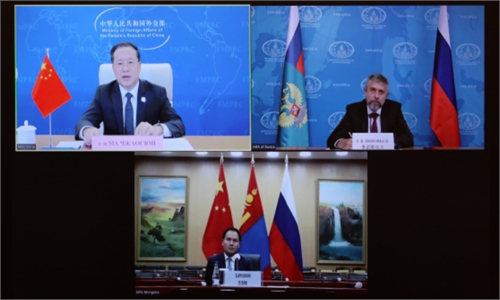
View of piles of coal on a quay in Rizhao, East China's Shandong Province Photo: cnsphoto
Mongolia launched a 233-kilometer cross border rail line between the Tavan Tolgoi coal field and Gashuun Sukhait on the Chinese border over the weekend, a move that is expected to boost China-Mongolia coal trade, experts said.
Mongolian President Ukhnaa Khurelsukh was among the dignitaries attending a ceremony to mark the launch on September 9, ending a decade-long wait for the crossing, according to an AFP report.
The Tavan Tolgoi railway has the capacity to export between 30 million and 50 million tons of coal to China annually, AFP said, citing Tavantolgoi Railway LLC, the state-owned entity that built the line.
Tavan Tolgoi is rich in coking coal, an essential ingredient in steel-making.
The railway is also expected to lower the cost of transporting coal to $8 per ton, compared to $32 per ton when coal was delivered by truck, according to the railway authority.
"The launch of the rail service will no doubt greatly boost bilateral coal trade and lower costs," Lin Boqiang, director of the China Center for Energy Economics Research at Xiamen University, told the Global Times on Monday.
According to Lin, coal from Mongolia mainly serves demand for the Northeast region of China, predicting that the local price for coal will drop significantly with the opening of the train service.
The railway will also further lift the country's coal exports to China, since for years coal has been transported in trucks to China from Mongolia.
According to industry newspaper China Metallurgical News, Mongolia's coal exports surged 225.8 percent on a yearly basis to reach 2.36 million tons in June, the highest since early 2021. The country's coal exports to China jumped 224.2 percent year-on-year in the month to hit 2.1 million tons, it said.
During State Councilor and Foreign Minister Wang Yi's visit to Mongolia in early August, China and Mongolia have reached broad consensus including strengthening cooperation at the border, promoting the opening of ports and connection of railways and highways to the largest possible extent, so as to keep the industrial and supply chains stable and unimpeded.
The two sides signed the Memorandum of Understanding on the cross-border railway connection program at the Gants Mod port, which will be important in helping Mongolia to expand its opening-up and achieve strong growth, read a statement on the official website of Chinese Foreign Ministry on August 8.
The Chinese and Mongolian economies are complementary and have great cooperation potential, with China owning a large market, advanced technologies and sufficient capital, while Mongolia is home to rich mineral resources.
China has been Mongolia's biggest trading partner and the top source of foreign investment for 18 consecutive years. According to data from Chinese Ministry of Commerce, the bilateral trade volume hit $9.12 billion in 2021, up 35.3 percent year-on-year.

